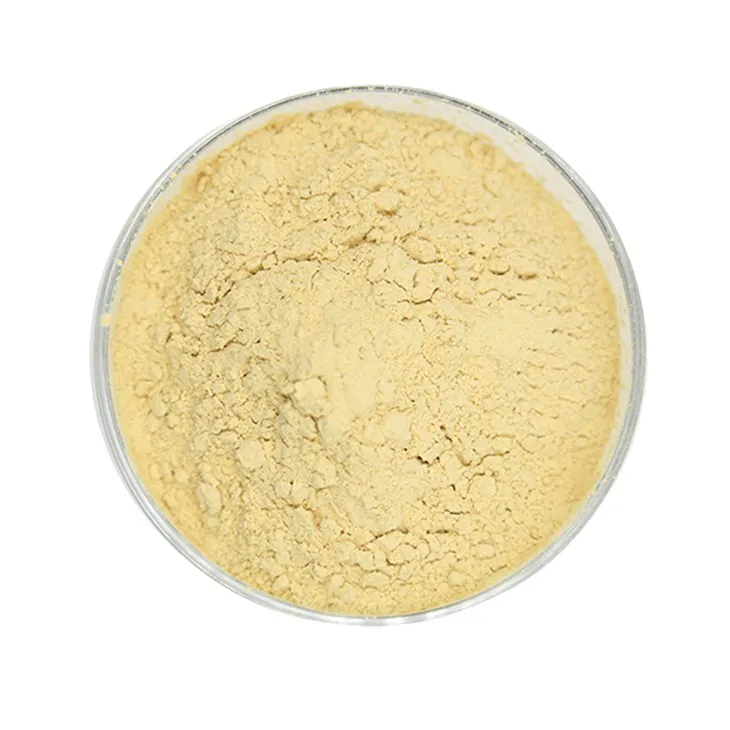- 0086-571-85302990
- sales@greenskybio.com
Genistein - Uses and Benefits for Refreshing the Mind.
2024-11-13

1. Introduction to Genistein
Genistein is a natural compound that has been garnering significant attention in recent years due to its potential health benefits. It is an isoflavone, a type of phytoestrogen, which is predominantly found in plants such as soybeans. Genistein has a unique chemical structure that endows it with a variety of biological activities.

2. The Brain - A Complex Organ in Need of Support
The brain is one of the most complex and vital organs in the human body. It is responsible for a myriad of functions, including but not limited to, cognition, memory, emotion regulation, and the control of voluntary and involuntary movements. However, the brain is also highly susceptible to various forms of stressors. These can range from oxidative stress, which is caused by an imbalance between the production of reactive oxygen species (ROS) and the body's antioxidant defense mechanisms, to age - related decline in cognitive function.

3. Genistein's Impact on the Central Nervous System
3.1 Stimulation of the Central Nervous System
One of the key aspects of Genistein in relation to brain health is its ability to stimulate the central nervous system in a rather gentle yet effective manner. This stimulation is not overly aggressive like some stimulants, but rather provides a natural boost. It is believed that Genistein interacts with certain receptors in the brain, which in turn activates neural pathways associated with arousal and attention. This can have a direct impact on reducing mental fatigue. For example, in a study where participants were exposed to cognitive tasks for an extended period, those who had been supplemented with Genistein showed less signs of fatigue compared to the control group.
3.2 Increasing Concentration
Concentration is a crucial aspect of cognitive function. Genistein has been shown to play a role in enhancing concentration. By modulating the neurotransmitter systems in the brain, it can help to focus the mind. Neurotransmitters such as dopamine are involved in attention and focus, and Genistein may influence the release or re - uptake of these neurotransmitters. In a classroom - like setting, students who were given Genistein - containing supplements were found to be more attentive during lectures and had better performance in tasks that required sustained concentration.

4. Genistein's Antioxidant Properties and Brain Cell Protection
4.1 The Role of Antioxidants in the Brain
Antioxidants are substances that can prevent or slow damage to cells caused by free radicals. In the brain, the presence of antioxidants is of utmost importance. Free radicals are constantly generated as a by - product of normal cellular metabolism. However, when there is an excess of free radicals, they can cause oxidative stress, which can lead to damage to brain cells. This damage can manifest in various ways, such as impaired cognitive function, neurodegenerative diseases, and even mood disorders.
4.2 How Genistein Acts as an Antioxidant in the Brain
Genistein functions as an antioxidant in the brain through multiple mechanisms. Firstly, it can directly scavenge free radicals. It has the ability to donate electrons to free radicals, thereby neutralizing them and preventing them from causing further damage. Secondly, Genistein can up - regulate the body's own antioxidant defense systems. It can increase the production of antioxidant enzymes such as superoxide dismutase (SOD) and glutathione peroxidase (GSH - Px). These enzymes play a crucial role in breaking down free radicals and maintaining the redox balance in the brain. In animal studies, it has been observed that animals fed with a diet rich in Genistein had lower levels of oxidative stress markers in their brains compared to those on a normal diet.
4.3 Protecting Brain Cells from Damage
The protection of brain cells from damage is essential for maintaining optimal brain health and performance. Genistein's antioxidant properties are a key factor in this regard. By preventing oxidative stress, it can safeguard the integrity of brain cells. This includes protecting the cell membranes, which are crucial for maintaining the proper functioning of the cells. Additionally, Genistein can also protect the mitochondria within the brain cells. Mitochondria are the powerhouses of the cells, and any damage to them can have a significant impact on cell function. By protecting mitochondria from oxidative damage, Genistein helps to ensure that the brain cells have sufficient energy to carry out their functions.

5. Genistein and Cognitive Function
5.1 Memory Enhancement
Memory is a complex cognitive function that can be influenced by various factors. Genistein has been studied for its potential role in memory enhancement. It is thought that Genistein may promote the growth and survival of neurons in the hippocampus, a region of the brain that is crucial for memory formation and consolidation. In aging populations, where there is often a decline in hippocampal function, Genistein may offer a means to slow down or even reverse this decline. For example, in elderly rats, those that were given Genistein supplements showed improved performance in memory - related tasks compared to their untreated counterparts.
5.2 Cognitive Decline and Genistein
As people age, there is an increased risk of cognitive decline, which can lead to conditions such as dementia and Alzheimer's disease. Genistein may have a role in preventing or delaying this cognitive decline. Its antioxidant and neuroprotective properties can help to maintain the health of the brain as it ages. Moreover, Genistein may also have an impact on the clearance of amyloid - beta plaques, which are a characteristic feature of Alzheimer's disease. By reducing the accumulation of these plaques, Genistein may potentially slow down the progression of the disease.
6. Dietary Sources of Genistein and Optimal Intake
6.1 Foods Rich in Genistein
The primary dietary source of Genistein is soy products. This includes soybeans, tofu, soy milk, and tempeh. These foods are not only rich in Genistein but also provide other essential nutrients such as protein, fiber, and vitamins. In addition to soy products, some legumes and certain herbs may also contain small amounts of Genistein. However, the concentration of Genistein in these non - soy sources is relatively low.
6.2 Determining Optimal Intake
Determining the optimal intake of Genistein is a complex matter. It depends on various factors such as age, sex, and overall health status. For adults, current research suggests that a moderate intake of soy - based products can provide a sufficient amount of Genistein. However, more research is needed to establish precise guidelines for optimal Genistein intake. It is also important to note that while Genistein has many potential benefits, excessive intake may have some potential risks, such as hormonal imbalances in certain individuals.
7. Genistein Supplementation: Pros and Cons
7.1 The Benefits of Supplementation
For individuals who may not be able to obtain sufficient Genistein from their diet, supplementation can be an option. Genistein supplements can provide a concentrated dose of the compound, which may be beneficial for those looking to enhance their brain function or protect their brain health. Supplementation may also be useful for people with specific health conditions that are associated with oxidative stress or cognitive decline. For example, in patients with mild cognitive impairment, Genistein supplements may help to slow down the progression of the condition.
7.2 Potential Risks and Considerations
However, there are also potential risks associated with Genistein supplementation. As mentioned earlier, excessive intake of Genistein may disrupt hormonal balance in some individuals. This is particularly a concern for women, as Genistein has estrogen - like properties. Additionally, the quality and purity of Genistein supplements on the market can vary widely. Some supplements may contain contaminants or inaccurate labeling. It is therefore crucial for consumers to choose high - quality supplements from reliable sources and to consult a healthcare professional before starting any supplementation regimen.
8. Conclusion
In conclusion, Genistein has a wide range of potential applications and benefits in relation to revitalizing the brain. Its ability to stimulate the central nervous system, increase concentration, and protect brain cells through antioxidant properties makes it a promising compound for maintaining optimal brain health. However, more research is still needed to fully understand its mechanisms of action and to establish precise guidelines for its use, whether through dietary sources or supplementation. With further investigation, Genistein may prove to be a valuable addition to strategies for promoting brain health and preventing cognitive decline.
FAQ:
What is the main way genistein affects the brain?
Genistein mainly affects the brain by gently and effectively stimulating the central nervous system. This helps in reducing mental fatigue and enhancing concentration.
How do the antioxidant properties of genistein contribute to brain health?
The antioxidant properties of genistein can protect brain cells from damage. Since brain cell integrity is essential for good brain health and performance, this protection is very crucial.
Are there any side effects of using genistein for brain revitalization?
Currently, while genistein shows potential benefits for the brain, more research is needed regarding potential side effects. However, in general, it is important to use any supplement in moderation and under the guidance of a healthcare professional.
Can genistein improve long - term brain function?
There is evidence to suggest that genistein's ability to protect brain cells and stimulate the central nervous system could potentially contribute to long - term brain function improvement. But further studies are required to fully understand its long - term effects.
How can one incorporate genistein into their diet for brain health?
Genistein can be found in certain foods such as soy products. Incorporating more soy - based foods like tofu, soy milk, and edamame into the diet can be a way to increase genistein intake for potential brain health benefits.
Related literature
- Genistein and Brain Health: A Comprehensive Review"
- "The Role of Genistein in Central Nervous System Function"
- "Antioxidant Properties of Genistein: Implications for Brain Cell Protection"
- ▶ Hesperidin
- ▶ Citrus Bioflavonoids
- ▶ Plant Extract
- ▶ lycopene
- ▶ Diosmin
- ▶ Grape seed extract
- ▶ Sea buckthorn Juice Powder
- ▶ Fruit Juice Powder
- ▶ Hops Extract
- ▶ Artichoke Extract
- ▶ Mushroom extract
- ▶ Astaxanthin
- ▶ Green Tea Extract
- ▶ Curcumin
- ▶ Horse Chestnut Extract
- ▶ Other Product
- ▶ Boswellia Serrata Extract
- ▶ Resveratrol
- ▶ Marigold Extract
- ▶ Grape Leaf Extract
- ▶ New Product
- ▶ Aminolevulinic acid
- ▶ Cranberry Extract
- ▶ Red Yeast Rice
- ▶ Red Wine Extract
-
Grape Seed Extract
2024-11-13
-
Plantain extract
2024-11-13
-
Horse Chestnut Extract
2024-11-13
-
Lily extract
2024-11-13
-
Hawthorn Extract
2024-11-13
-
Epimedium extract powder
2024-11-13
-
Ginger Extract
2024-11-13
-
Grape Leaf Extract
2024-11-13
-
Boswellia Serrata Extract
2024-11-13
-
Polygonum multiflorum extract
2024-11-13





















